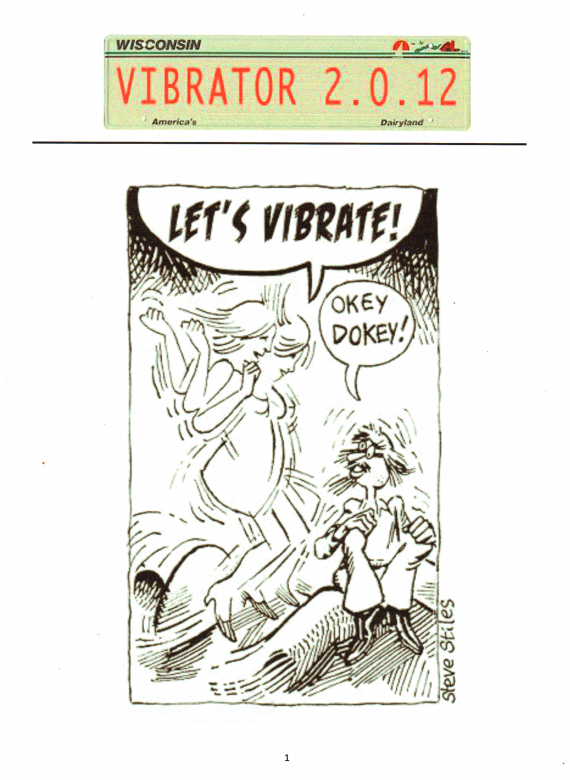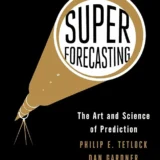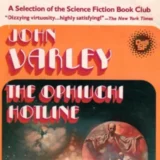
Fanzines reviewed: JOURNEY PLANET (#21), and VIBRATOR (2.0.12)
(Please note: Zine reviews are normally prepared a week or more in advance of publication of this column and may not necessarily include the latest issue available, but the link to multiple issues given at the bottom of each review probably does.)

Journey Planet (#21) – March 2015 – Find it here
Faneds: Chris Garcia, Warren Buff, & James Bacon. Genzine.
If memory serves (it usually refuses) “Journey Planet” has previously been nominated for a Hugo on three occasions (Chris Garcia won in 2011 for his perzine “Drink Tank” co-edited with James Bacon. This was the occasion of Chris Garcia’s celebrated victory collapse on stage, a spectacle considered the greatest Hugo acceptance speech of all time and consequently nominated for a Hugo the following year.) This year’s nominees have been announced and Journey Planet is up again, for the fourth time. Perfect excuse to review.
I had originally intended to look at the previous issue, but as each issue of Journey Planet tends to be dedicated to a particular theme, #20 was devoted to a variety of sports, a topic of doubleplus-unpositive interest to me. So I skipped it.
But THIS issue! Warren Buff came up with the idea. Have contributors describe “the greatest year” in the history of science fiction. Naturally they’d (probably) each choose a different year, and they did, namely 1939, 1953, 1967, and 1999. All except Juan Sanmiguel, who waffled a bit, choosing instead “to pick some years where significant things happened in some of my fandoms.” Fair enough.
Point is I can’t imagine a more invigorating and stimulating theme. I love the past, especially the history of our beloved genre. GOT to read this zine!
For Ben Yalow 1939 was significant because it marked the first year J.W. Campbell began to impact the field, the backlog of material acquired for Astounding Magazine by his predecessor finally having been cleared away leaving Campbell to concentrate on publishing the type of fiction HE preferred, like Heinlein’s first story “Life-Line” and A.E. van Vogt’s first story “Black destroyer.” Thence began “the Golden Age” of science fiction in terms of new writers introduced and the old pulp style thrown out the window.
To Brad Lyau 1953 is memorable for both quality and quantity. For instance, considering quality, what could be better than the four classic SF novels published that year:
“Fahrenheit 451” by Ray Bradbury
“Childhood’s End” by Arthur C. Clarke
“The Space Merchants” by Frederik Pohl and C.M. Kornbluth
“More Than Human” by Theodore Sturgeon
I have yet to read the last one, but the first three are definitely in my top ten list of best SF novels of all time.
He adds: “Besides the high quality of novels, there is also the matter of quantity. Genre science fiction, as most of us know, emerged from the pulp magazines of the first half of the 20th century. After World War II the paperback revolution took off and the pulps of all genres began to die off, EXCEPT for science fiction magazines. SF magazines actually increased, peaking in – you guessed it – 1953 with over 30 titles.”
Juan Sanmiguel considers 1993 important for the advent of the Babylon 5 pilot and subsequent series. “After five years of emotional reserve from ‘Star Trek: The Next Generation,’ it was great to see a passionate human response to a situation… Straczynski explained that ‘Babylon 5’ would be a 5-year mini-series with a beginning, middle, and end… Not only did the show succeed, but also influenced future shows like ‘Lost’ and ‘Battlestar Galactica’ to have story arcs.”
For Warren Buff 1967 is a seminal year, what with the onslaught of New Wave SF fiction as best exemplified by the “Dangerous Visions” anthology put together by Harlan Ellison. On the other hand, he considers the year in film quite pathetic, being the last year of typical “schlock science fiction films,” citing ‘Mars Needs Women’ as an example.
I don’t know. 1967 also presented the films “Barbarella,” “Diabolik,” “Je T’aime, Je T’aime,” “Privilege,” “The Power,” and “Quatermass and the Pit.” All classy and stylish films in their own right and way above the schlock level methinks. But I admit nothing compared to the gigantic impact of “2001” on the popular imagination the following year. A rather better film some would say.
Chris Garcia zeros in on 1999 saying “1999 changed film, for sure, and the most significant films were genre. The written SF was top-notch, the television SF was great, the comics were great. How could any other year compete?”
He describes “The Blair Witch Project” as “the most important film in the last thirty years… We saw tons of “Blair Witch” knock-offs in the early 2000s, and ever since the hand-held camera has become a standard. It was “Blair Witch” that brought that to mainstream cinema…”
I personally HATE the hand-held camera phenomenon, especially in light of the fact that many digital cameras these days have image-steadying programs built in so the amateurish aspects of “hand-held” is really a kind of artsy-fartsy pretence. With my aging eyes, fuzzy, out of focus shots shaking all over the place make me want to vomit. Literally. I walk out of films like that. Or switch channels if on TV. Besides, I’m so old-fashioned I prefer to know what I’m looking at when I stare at a screen. Exaggerated camera motion blurring the image is a visual crime as far as I’m concerned. Screw directors who do it deliberately. (This rant has been brought to you by the Old Pharts League.)
Chuck Serface (?) contributes a prose poem of sorts (not to my taste) arguing Hugo gernsback created a continuously evolving “greatest year” as the years roll by, if I interpret the poem correctly. He has a point.
I love the fact that the zine is illustrated throughout with depictions of futuristic buildings chosen by Chris Garcia. The never-built Palace of the Soviets for example (Stalin must have loved wedding cakes), or the clunky and impractical “Habitat” apartment complex from Expo 67 in Montreal, and the stunningly impressive and somewhat frightening lobby of the Hyatt Regency hotel in San Francisco. Intriguing stuff.
Journey Planet worth reading? – Heck yah. Although, considering I but touched on the highlights of the material discussed, the amount of text this issue is somewhat less than usual I think. Something to do with not enough lead time for potential contributors to get their articles done. But what is present is extremely interesting and great fun.
As for the future, James Bacon writes “We are working on some future issues themed as follows; Art, Dan Dare, Richard III, Penguin Books, Epistolary & Correspondence and Super Heroes. If you are interested in an element and would like to write – let us know.”
I’m particularly looking forward to the issue devoted to Dan Dare, Britain’s most famous Spaceman!
( Multiple issues of Journey Planet here )

Vibrator (#2.0.12) – January 2015 – Find it here
Faned: Graham Charnock. British clubzine.
On its efanzines.com page Vibrator is introduced as follows:
“Graham Charnock’s Vibrator made its first appearance in the seventies (you had to be there) and is now back with much the same format, a highly personal short and zingy zine mostly exhibiting the editor’s esoteric and sometimes scabrous views.”
“Designed to both entertain and offend, it deals with matters of life, death, sex and nastiness, and it aims to establish itself as the *new* Focal Point Fanzine, at least for people who like to be entertained and offended. With a regular and frequent publication schedule it aims to get your views out to the people who care as quickly as possible.”
“Vibrator won the 2014 Nova Award for best fanzine.”
To this can be added the fact that Vibrator just won the 2015 FAAn Award for “Best Fanzine” at the recent Corflu (the last remaining convention entirely devoted to fanzine fandom). Granted, the fact that this year’s Corflu was held in the UK may have skewed the vote a trifle, in that Brit fans may have been extra motivated to participate, but any fanzine fan in the world may place their votes, and at no cost I might add. I know I did. The fact that only 39 people bothered to vote is a bit sad (Art Widner’s famous polls during WWII only got about as much) but it can be safely assumed that those who DID vote are among the most dedicated fanzine fans on the planet so the win DOES indeed count for something.
Notoriety if nothing else, to judge by the blurb quoted above. Charnock prides himself on being “ornery,” to use the American term. But is he? Let’s see.
Off to a good start. He reflects on what was then the upcoming Corflu:
“I am not saying *our* Corflu will be any better or worse than all the others, but I certainly hope it will be as memorable, and if you miss it, then you won’t have anything to remember, it’s that simple. Corflu is not a full-on Worldcon experience but a cozy-con where everybody tends to know everybody else rather than recoil in horror from complete strangers as at Worldcons… After attending once, you *will* know everybody else. There is no exclusionism at Corflus and no need for harassment codes; anybody who misbehaves will simply be taken into a quiet corner by our Chairman (Pat Charnock) and given a stern talking to. That’s how we roll at Corflu. So unless you are Ian Williams there is no reason not to join us. Or even if you are Ian Williams.”
This naturally brings up the question of the nature of Ian Williams. Is the above a warning? An affectionate tribute? A sly jest? Presumably Brit fans know. I don’t. But it does sound vaguely insulting, which is promising.
As for Corflu, I imagine it was great fun. I think it to be similar to a now extinct fanzine convention called Ditto, one of which I attended in one of my rare forays south of the border to Seattle. To give you an idea, I checked into the hotel on Friday and COULDN’T FIND the convention, so spent the evening watching a documentary on Dung Beetles. Felt a bit discombobulated. Had I imagined the convention? Yet somebody had cashed my cheque…
Turned out the formal programming (rather informal actually) didn’t start till Saturday and the entire roster of attendees was busy partying all Friday in the hotel bar, which I had not thought to enter as I had decided to stop drinking for a while (five years in all). Plus I had been intimidated by all the loud, raucous laughter (and occasional scream) emanating from the bar. Figured a trucker’s convention at the very least, so stayed clear of it. Pity.
Anyway, next up is an article by Charnock which begins:
“Are you really into the Shadows? The Shadows rose to fame as Cliff Richard’s backing group, supplanting him from the number one position with their hit Apache, then going on to have a string of hits in their own right. Everyone remembers Apache, of course, but what of Foot-Tapper or even The Rise & Fall of Flingel Bunt. The Shadows always had a sense of humour with regard to their titles, hence such titles as The Stars Fell on Stockton and Theme from a Filleted Plaice. It’s hard to conceive of anyone not knowing the Shadows oeuvre, but Vibrator is such a wide ranging and eclectic magazine that I feel I may have to fill in a few of the details. There may be people living in the furthest outposts of deep and dark Texas who have never heard of them, after all.”
Ahh, uhhm… who’s Cliff Richards?
Or the lesser known Shadows? I’m egalitarian. I treat everyone equally. My ignorance is equal opportunity all the way. Cliff and the Shadows all the same to me…
You might think, given my lack of musicological knowledge, that I’d find the article boring. Not so. It’s quite fascinating. Inspired by the Shadows Charnock joined a somewhat-less-than successful band called the “Burlingtons.” It eventually fell apart for a variety of interesting reasons such as “Herbert had met a woman and discovered playing with women was even better than playing with his guitar.” Odd, most rock bands seem to accommodate both guitars AND women surprisingly easily. In fact, I’m told guitars attract women (not sure if it works the other way around) so giving up guitar-playing seems counter-productive, or counter-intuitive, or just plain against the laws of lust and god. Which god? I’m thinking Pan.
Perhaps for this reason Charnock helped form a splinter band called “Eric and the Magnets” (guitars as chic-magnets?) which didn’t last very long. Years later he learned that two of his Burlington band-mates had died. “They were both lifelong employees of the Fullers brewery and had died of alcoholism.” Very British, methinks. I’m reminded of a great uncle of mine who was such a drunkard the family pretended he was dead for at least two decades before he actually died. Was run over by a brewery truck during the wartime blackout in London. He’d probably been trying to flag it down.
Elsewhere we learn that Charnock has been accused of writing and composing more than three hundred songs. Clever lad that I am, I suspect he is somewhat interested in music. Probably a hobby of his.
The bulk of the remainder of the zine is a strong loc column. Charnock likes to begin each loc with headings of his own devising, such as:
FIRST OUT OF THE TRAPS THIS MONTH WITH A LOC WAS PHIL PALMER ALL THE WAY FROM NEW ZEALAND. IF I RAN AN ALSO HEARD FROM FEATURE HE WOULD OBVIOUSLY BE IN IT, BUT I DO NOT, SO I AM FORCED TO SHARE HIS PITHY COMMENTS HERE:
and:
FRED SMITH IS LONELY AND WOULD LIKE TO MEET PEOPLE WHO LIKE BIG BANDS AND BIG BANG THEORY
Vibrator worth reading? – Yes. It is very entertaining and interesting. Yet this particular issue does not appear to live up to Charnock’s avowed purpose of being the perfect gadfly. Whatever could be wrong? He provides an answer on the last page:
“Not much meat in this issue, I think you will agree, but at least it has a whole-page cover, sort of. Thanks to Steve Stiles for that. The trouble is occasionally for the good of my health I go on the wagon and stop drinking, but being sober is not good for my creativity, and the stunningly witty articles and pieces of intellectual literary exposition don’t come as easily as they might.”
Hmm, being sober is a curiously anti-British sort of state to be in (fannish legend has it). I recommend caffeine, buckets of caffeine, as an adequate substitute. Has the added advantage, after you’ve pubbed your ish, of encouraging you to stay up all night worrying over how your zine is going to be received. Very fannish.
( Multiple issues of Vibrator here )
BY THE WAY:
You can find a fantastic collection of zines at: Efanzines
You can find yet more zines at: Fanac Fan History Project
You can find a quite good selection of Canadian zines at: Canadian SF Fanzine Archive









